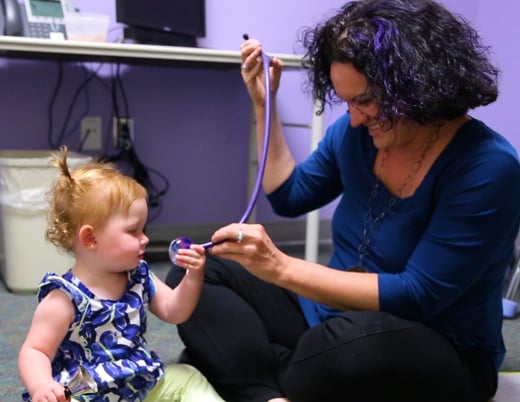How close are we to bridging the gap from standard glucose monitoring to a true artificial pancreas?
The Barbara Davis Center for Diabetes at the University of Colorado School of Medicine, led by site principal investigator Paul Wadwa, MD, of Children’s Hospital Colorado, was one of 16 sites that recently participated in a 13- week trial of an artificial pancreas used for managing Type 1 diabetes. The resulting study, published in the New England Journal of Medicine, was funded by the National Institute of Diabetes and Digestive Kidney Diseases, part of the National Institutes of Health. The study used levels of hemoglobin A1C (HbA1C) as the primary outcome measure and included a large group of participants — children and adults between the ages of 6 and 79. Participants were randomized in a 2-to-1 ratio to the Beta Bionics iLet® Bionic Pancreas or standard of care insulin delivery with a pump or insulin pen.
Introducing the artificial pancreas closed-loop insulin system
For the last few decades, the medical field has seen technological advancements that make the administration of insulin safer, more reliable and easier. Blood glucose level control is vital for people to live healthy lives but can be complex and burdensome — especially for children who are much more unpredictable in their activities and may not know how to communicate their needs well.
“While we haven’t found a cure,” Dr. Wadwa says, “this is a big step for treatment with a fully closed-loop system — basically, an artificial pancreas that continuously monitors glucose and pumps insulin when needed.”
Complete with a glucose monitor, insulin pump and monitoring app, the bionic pancreas does the work of a real pancreas, automating insulin delivery. Except for occasionally refilling the wearable insulin reservoir, the device requires minimal effort from the patients. Unlike existing hybrid closed-loop systems, which require a combination of insulin delivery inputs (e.g., carbohydrate to insulin ratio, total daily dose or basal rates), the closed-loop system uses an advanced algorithm that continuously monitors glucose and automatically administers the correct dose of insulin to meet patients’ needs. Simply enter the weight of the patient to get a baseline for the dose scaling and the algorithm continuously adapts. Instead of counting carbohydrates, users are only required to indicate when they’re eating breakfast, lunch or dinner and if their portions are smaller or larger than usual. That’s it. Simple.
“Closed-loop systems mean fewer painful finger pricks, fewer manual insulin injections and less room for error,” Dr. Wadwa says. “Every single dose is determined by the artificial pancreas.”
Improved blood glucose control
Overall, the study showed that the closed-loop system improved participants’ blood glucose control throughout the day and even while sleeping when the risk for dangerously low glucose levels is the highest. The incidence of severe hypoglycemia (although a little higher) did not significantly differ between the two study groups.
“The difference observed for incidence of severe hypoglycemia was not statistically significant and overall low for both the intervention and standard care group,” Dr. Wadwa says.
The most impressive finding was that HbA1C levels decreased from 7.9% to 7.3% in the bionic pancreas group while they remained unchanged at 7.7% in the standard care group — indicating that glucose control was indeed better in the bionic pancreas group.
What’s more, the bionic pancreas group spent just as much time as the standard care group under glucose levels of 54 mg per deciliter — a key secondary outcome of the study indicative of good glucose control.
Reducing the burden of diabetes management
The fully closed-loop bionic pancreas offers a glimpse into the not-so-distant future of diabetes technology, where medical advancements have decreased the burden of diabetes management and improved quality of life through less poking and prodding — where patients’ minds are at ease while an automatic system makes decisions about how to best manage blood sugar.
“As groundbreaking as this technology is,” Dr. Wadwa says, “the impact to public health and quality of life is just as monumental. With more closed-loop systems being approved by the FDA and more clinically available options, we believe people on insulin for their diabetes will see overall improved diabetes control which could mean fewer long-term effects of hyperglycemia, such as eye disease, kidney disease and nerve damage.”
Featured Researchers

Paul Wadwa, MD
Director, Pediatric Clinic
Barbara Davis Center for Childhood Diabetes
University of Colorado Anschutz Medical Campus
Professor
Pediatrics-Barbara Davis Center
University of Colorado School of Medicine





 720-777-0123
720-777-0123










